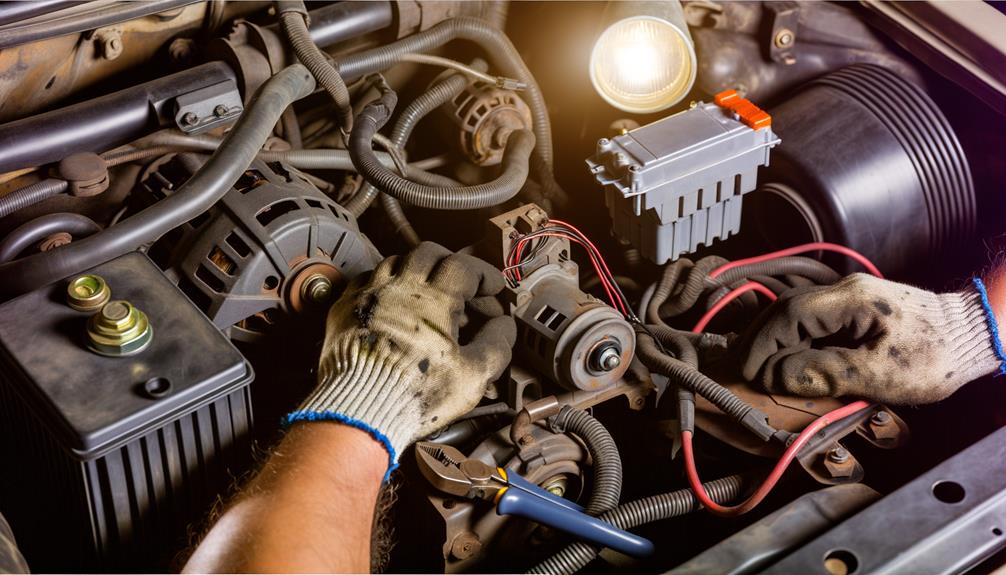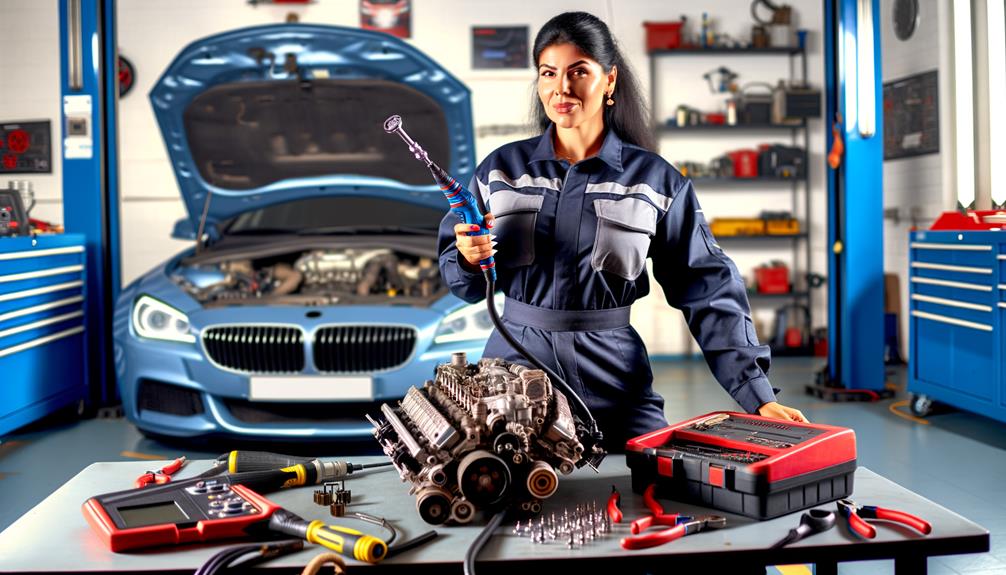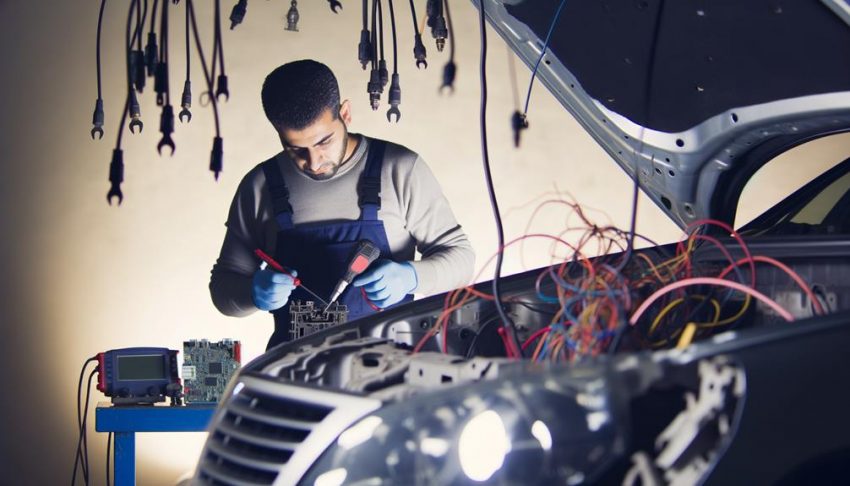When your car's electrical system starts acting up, you might wonder who exactly handles these intricate issues. Auto electricians, often ASE certified, are the go-to professionals for diagnosing and repairing everything from dead batteries to malfunctioning alternators. These specialists use advanced diagnostic tools to guarantee your vehicle runs smoothly, but not all auto electricians are the same. Some focus on general systems, while others have expertise in hybrid and electric vehicles. So, how do you choose the right one for your car's specific needs? Let's explore the critical factors to take into account.
Contents
Types of Auto Electricians
Understanding the various types of auto electricians is essential in selecting the right professional for your vehicle's electrical needs. First, there's the general auto electrician, who specializes in diagnosing and repairing a wide range of electrical issues. They handle everything from battery problems to alternators and starters. When facing common auto electric repair tasks, these professionals are your go-to experts.
ASE certified technicians have undergone rigorous training and certification, ensuring their expertise across various vehicle makes and models. Their deep understanding of automotive electrical systems makes them highly reliable for thorough diagnostic services and complex repairs.
Specialized electricians focus exclusively on certain aspects of vehicle electrical work. Whether it's lighting systems, charging systems, or advanced electronic diagnostics, these professionals bring a high level of expertise to their niche. If your vehicle's electrical system requires specific attention, specialized electricians are the right choice.
Hybrid and electric vehicle technicians are trained specifically to manage the unique electrical systems in hybrid and electric cars. These vehicles often require specialized knowledge and tools, making these technicians indispensable for maintaining and repairing advanced automotive technology.
Mobile electricians offer the convenience of providing electrical repair services at your location. They can quickly diagnose and fix issues, saving you the hassle of visiting a shop. This service is particularly beneficial for urgent battery problems or when the car won't start.
Common Electrical Issues
Having explored the various types of auto electricians, let's now examine some common electrical issues that can plague your vehicle. One of the most frequent problems is dead batteries. Often the primary reason for starting failures, dead batteries may require testing or replacement. Confirming your battery is in good condition is vital for keeping your vehicle running smoothly.
A malfunctioning alternator is another common culprit. If your vehicle's battery drains quickly or you notice electrical instability, the alternator could be the issue. Immediate attention is necessary to prevent further complications and potential damage to other electrical components. Starter problems, often indicated by clicking sounds or complete silence when turning the key, necessitate professional evaluation. Accurate diagnosis and timely repair services can save you from being stranded.
Ignition switch malfunctions may mimic battery issues, causing the vehicle to fail to start. Thorough diagnostics by a team of experts are essential to pinpoint and resolve the problem. Faulty spark plugs can also greatly impact engine performance. Regular checks and maintenance services confirm that spark plugs are functioning correctly, maintaining your vehicle's peak performance.
Addressing these electrical problems promptly with the help of professional auto electricians will not only extend the lifespan of your vehicle but also enhance its reliability. By understanding these common issues and seeking timely repair services, you can guarantee your vehicle remains in top condition, providing peace of mind and a smooth driving experience. Remember, maintaining your vehicle's electrical system is a fundamental aspect of overall vehicle maintenance.
Key Components

When it comes to the key components of your vehicle's electrical system, there are several significant parts you need to be aware of. The alternator, battery, and starter play pivotal roles in maintaining your vehicle's functionality and guaranteeing smooth engine operation.
Alternators are essential power components that convert mechanical energy into electrical energy. They sustain the battery's charge and power the vehicle electrical systems. A malfunctioning alternator can cause your battery to drain and lead to unexpected breakdowns.
Batteries provide the fundamental power needed for the ignition, starter, and other electrical components of your vehicle. Typically, batteries last between 3-5 years, but regular testing is critical for maintaining peak performance and preventing starting issues.
Starters are the components responsible for initiating engine operation. They utilize electrical power from the battery to start the engine. If you hear clicking sounds or experience a complete failure to start, your starter might need attention.
Here's a quick overview of these components:
| Component | Function | Maintenance Tip |
|---|---|---|
| Alternators | Convert mechanical to electrical energy | Regularly check for charging issues |
| Batteries | Supply power to ignition and electrical systems | Test every 6 months |
| Starters | Initiate engine operation | Listen for unusual sounds or failures |
| Electrical Systems | Integrate alternator, battery, and starter | Thorough inspection annually |
Your vehicle's electrical systems are complex, with these key components working together seamlessly. Regular maintenance and diagnostic services help guarantee that your charging system and all power components operate efficiently. By staying vigilant about these elements, you can prevent costly failures and keep your vehicle running smoothly.
Diagnostic Tools
Diagnosing electrical issues in your vehicle requires a suite of specialized tools tailored for precision and accuracy. Central to vehicle diagnostics are computerized scanners. These diagnostic tools interface with your car's onboard computer to read trouble codes, pinpointing specific malfunctions within the automotive electrical systems. By translating these codes, you gain insights into areas needing attention, streamlining the car electrical repair process.
Multimeters are indispensable in this toolkit, allowing you to measure voltage, current, and resistance across various electrical components. This capability is essential for troubleshooting, verifying circuit integrity, and making sure components operate within specified parameters. When it comes to more complex diagnostics, oscilloscopes offer advanced functionality. These devices visualize electrical signals in real-time, providing detailed insights into the behavior and performance of sensors and other significant systems. By capturing and analyzing waveforms, oscilloscopes help detect anomalies that might be missed by simpler tools.
Battery testers are another important component, designed to assess the health and charge capacity of your vehicle's battery. These diagnostic tools can determine whether the battery requires replacement or servicing, preventing potential starting issues. Equally important are wiring diagrams and schematics. These documents offer a detailed layout of your vehicle's electrical system, showcasing the connections between various components. Accurate wiring diagrams are crucial for tracing electrical paths, identifying potential faults, and making sure all repairs are correctly executed.
Incorporating these diagnostic tools and resources into your vehicle diagnostics routine guarantees a thorough and efficient approach to car electrical repair, helping you maintain the reliability and functionality of your automotive electrical systems.
Choosing the Right Technician

Selecting the right technician for your car's electrical work is vital to guaranteeing efficient and accurate repairs. Begin by seeking out ASE-certified technicians. These professionals have undergone rigorous training and possess the necessary skills to diagnose and repair electrical issues in vehicles. Choosing an ASE-certified technician guarantees a higher standard of expertise and reliability.
Next, consider the technician's experience with your specific vehicle make and model. A skilled technician familiar with your car's systems can provide more accurate diagnostics and repairs. This expertise is imperative, especially when dealing with complex electrical issues like a malfunctioning car battery or intricate wiring problems.
Customer reviews and testimonials are invaluable when evaluating the reputation and quality of a technician's repair services. Positive feedback from other car owners can give you confidence in the technician's ability to resolve your vehicle's electrical issues effectively.
Confirm the repair shop offers a warranty on electrical repairs. A warranty indicates the shop's confidence in the technician's work and the quality of the parts used. This assurance can provide peace of mind and financial protection in case issues arise after the repair.
Lastly, verify that the technician uses advanced diagnostic tools and technology. Proper diagnostic tools are vital for accurately identifying and resolving electrical problems in modern vehicles, which increasingly rely on complex electronic systems. Advanced technology in diagnostics can mean the difference between a quick, precise repair and a prolonged, frustrating troubleshooting process.
Frequently Asked Questions
Are Car Electrical Problems Expensive?
Car repair costs for electrical problems vary. Diagnostic tools help identify issues like wiring problems or faulty electrical components. Battery replacements range from $100 to $200. Labor rates at repair shops average $75 to $150 per hour. Regular maintenance tips and troubleshooting techniques can prevent high expenses. Insurance claims might cover some repairs.
Do Electrical Engineers Work on Cars?
Yes, electrical engineers work on cars by focusing on automotive electronics, vehicle wiring, and circuit diagnostics. They handle battery management, electrical systems, and troubleshooting techniques, integrating sensors and ensuring electrical safety in hybrid systems and advanced automotive technology.
Do Electricians Work on Electric Cars?
Electricians typically don't work on electric cars. For electric vehicle maintenance, automotive wiring systems, hybrid technology integration, battery management systems, electric motor troubleshooting, charging station installation, vehicle diagnostics tools, power distribution units, and electrical safety protocols, you'll need an EV technician with specialized training.
Who Works on the Electrical Part of a Motor Vehicle?
You'll need automotive electricians for vehicle wiring, electrical diagnostics, and troubleshooting techniques. They handle car battery issues, circuit analysis, and other electrical components. Repair shops employ these experts who follow safety procedures and utilize advanced automotive technology.
Conclusion
In conclusion, when you're dealing with car electrical issues, it's essential to choose an ASE-certified auto electrician. They specialize in various areas like general electrical systems and hybrid vehicles, using advanced diagnostic tools to pinpoint and fix problems efficiently. Regular maintenance and inspections by a skilled technician can prevent costly failures. So, for ideal vehicle performance, always rely on a professional who has the right expertise and precision in handling your car's electrical components.
